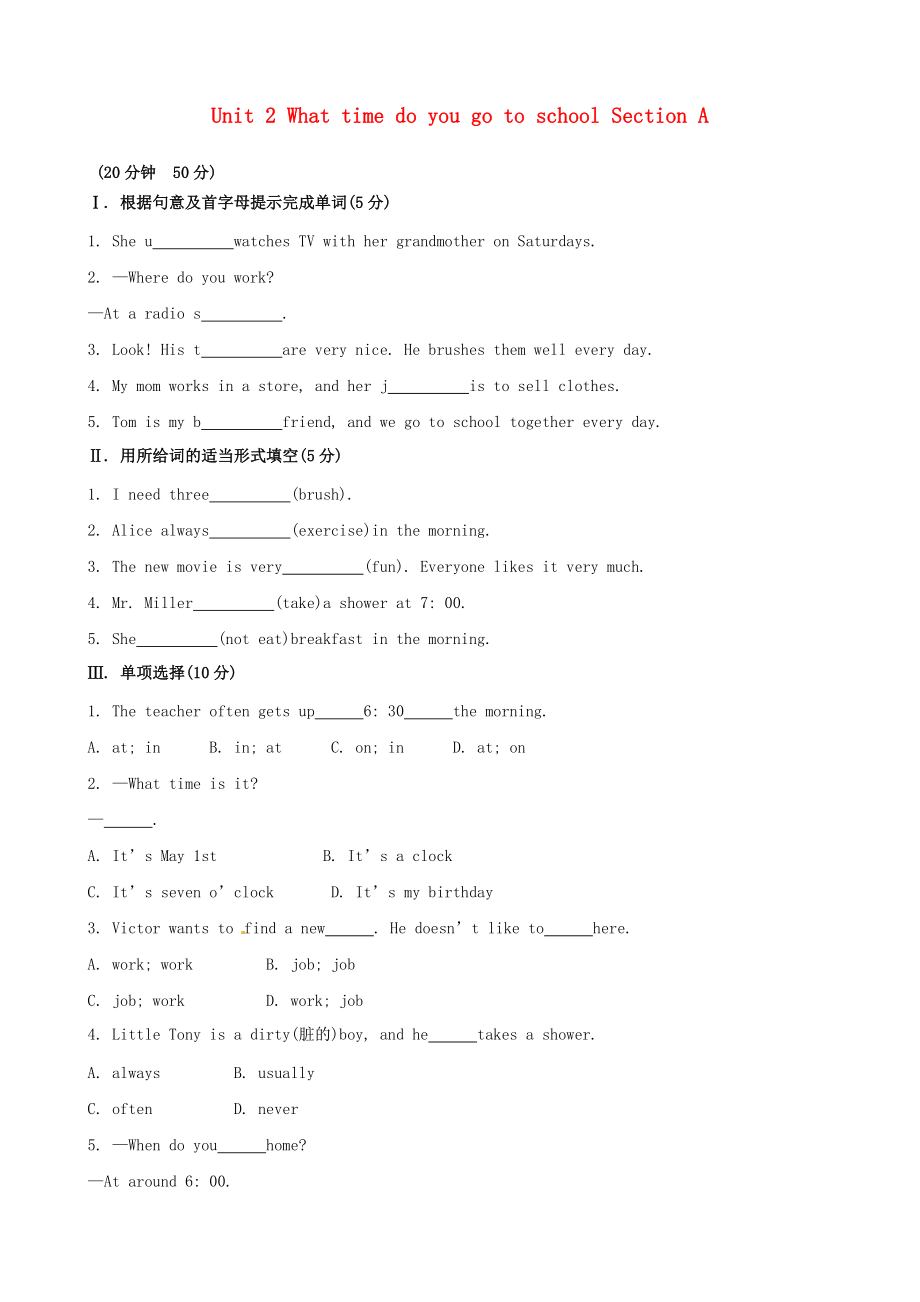《【金榜學(xué)案】七年級英語下冊 Unit 2 What time do you go to school Section A課時作業(yè) (新版)人教新目標(biāo)版》由會員分享�,可在線閱讀,更多相關(guān)《【金榜學(xué)案】七年級英語下冊 Unit 2 What time do you go to school Section A課時作業(yè) (新版)人教新目標(biāo)版(4頁珍藏版)》請在裝配圖網(wǎng)上搜索��。
1��、Unit 2 What time do you go to school Section A
(20分鐘 50分)
Ⅰ. 根據(jù)句意及首字母提示完成單詞(5分)
1. She u watches TV with her grandmother on Saturdays.
2. —Where do you work?
—At a radio s .
3. Look! His t are very nice. He brushes them well every day.
4. My mom works in a store, and her j
2�、 is to sell clothes.
5. Tom is my b friend, and we go to school together every day.
Ⅱ. 用所給詞的適當(dāng)形式填空(5分)
1. I need three (brush).
2. Alice always (exercise)in the morning.
3. The new movie is very (fun). Everyone likes it very much.
4. Mr. Miller (take)a shower at 7:
3、00.
5. She (not eat)breakfast in the morning.
Ⅲ. 單項(xiàng)選擇(10分)
1. The teacher often gets up 6: 30 the morning.
A. at; in B. in; at C. on; in D. at; on
2. —What time is it?
— .
A. It’s May 1st B. It’s a clock
C. It’s seven o’clock D. It’s my birthday
3. Victor want
4�����、s to find a new . He doesn’t like to here.
A. work; work B. job; job
C. job; work D. work; job
4. Little Tony is a dirty(臟的)boy, and he takes a shower.
A. always B. usually
C. often D. never
5. —When do you home?
—At around 6: 00.
A. to get B. get
C. get to D.
5���、gets
Ⅳ. 句型轉(zhuǎn)換(5分)
1. Anna does her homework at 7 o’clock. (改為否定句)
Anna her homework at 7 o’clock.
2. What’s the time? (改為同義句)
is it?
3. He usually watches TV in the evening. (對畫線部分提問)
he usually TV?
4. Tina usually goes to bed at nine o’clock. (對畫線部分提問)
6�、
Tina usually to bed?
5. My grandpa always reads newspapers in the morning. (改為一般疑問句)
your grandpa always newspapers in the morning?
Ⅴ. 完成句子(5分)
1. 你母親幾點(diǎn)起床?
What time does your mother ?
2. 他通常在每天早上6: 00穿衣服�����。
He at 6: 00 every morning.
7�、
3. 我朋友從事一份很有趣的工作。
My friend has .
4. 斯科特天天洗淋浴嗎?
Does Scott every day?
5. 他七點(diǎn)整吃早飯���。
He eats breakfast .
Ⅵ. 補(bǔ)全對話(10分)
從方框中選擇最佳選項(xiàng)完成對話��。
A. I get home at around 5: 15
B. I usually have some hamburgers and milk for it
C. When do you get home
8�、
D. What time do you usually get up
E. Class begins at eight o’clock
A: Hi, Mona! 1 ?
B: Well, I live near my school, so I get up at 6: 00. I never go to school late.
A: Do you have breakfast at home?
B: Yes, 2 .
A: When do you go to school?
B: 3 , so I go to school at 7: 30.
A: 4
9�����、?
B: I leave school at 5: 05 and 5 .
1. 2. 3. 4. 5.
Ⅶ. 任務(wù)型閱讀(10分)
Dear Johnson,
Do you want to know something about my weekends? Now I tell you about them.
I usually get up at five, but on weekends I get up at seven because I watch TV in the evening. After I get up,
10��、I eat breakfast. (1)At around seven thirty I go to the music club. I get there at eight. The class begins at eight ten. There the teacher shows us how to play the guitar. At noon we have lunch in the club. At four in the afternoon I get home. (2)I take a shower at around four thirty. Then my father
11����、gets home from work. I usually play with my father.
Do you think I am happy on weekends? What about your weekends? Tell me, will you?
Yours,
Lisa
1. What time does Lisa get up on weekends?
________________________________________________________________
2. Why does Lisa go to bed late on w
12、eekends?
________________________________________________________________
3. Where does Lisa have lunch on weekends?
________________________________________________________________
4. 將短文中(1)畫線句子譯成漢語�����。
________________________________________________________________
5. 將短文中(2)畫線句子變?yōu)橐话阋蓡柧洹?
_
13�����、_______________________________________________________________
答案解析
Ⅰ. 答案: 1. usually 2. station 3. teeth 4. job 5. best
Ⅱ. 答案: 1. brushes 2. exercises 3. funny 4. takes 5. doesn’t eat
Ⅲ. 答案: 1~5. ACCDB
Ⅳ. 答案: 1. doesn’t do 2. What time 3. When does; watch
4. What time does; go 5. Does; read
Ⅴ. 答案: 1. get up 2. usually gets dressed
3. an interesting job 4. take a shower
5. at seven o’clock
Ⅵ. 答案: 1~5. DBECA
Ⅶ. 答案: 1. At seven.
2. Because she watches TV.
3. In the club.
4. 在七點(diǎn)半左右, 我去音樂俱樂部。
5. Do you take a shower at around four thirty?
新課 標(biāo)第 一 網(wǎng)
 【金榜學(xué)案】七年級英語下冊 Unit 2 What time do you go to school Section A課時作業(yè) (新版)人教新目標(biāo)版
【金榜學(xué)案】七年級英語下冊 Unit 2 What time do you go to school Section A課時作業(yè) (新版)人教新目標(biāo)版

